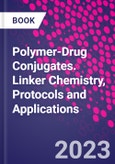Polymer-Drug Conjugates: Linker Chemistry, Protocols and Applications discusses important concepts, fundamentals and prospective applications of 'Linker Chemistry' in a clear-and-concise manner. The book provides vital information on chemical entities binding with the drug-polymer complex for targeted drug delivery systems. It highlights roles and significance, different classes and synthetic protocols as well as mechanisms of chemical bond formation in drug-polymer conjugation in drug delivery, also offering insights into the mechanism of polymer interaction with linker and drug molecules by biodegradable chemical bonding.
The protocol of binding with drug molecules is clearly explained and justified with case studies, helping researchers and advanced students in the pharmaceutical sciences understand fundamentals involved and related aspects in molecule designing for effective therapeutic benefits.
Please Note: This is an On Demand product, delivery may take up to 11 working days after payment has been received.
Table of Contents
1. Drug Delivery: The conceptual perspectives and therapeutic applications2. Rational design of linkers in polymer drug conjugates
3. Exploration of polymers in drug delivery: The structural and functional considerations
4. Chemistry of conjugation in drug delivery: The prospects of biodegradable and non-biodegradable bonds
5. Polymer-drug conjugation using ester and orthoester bond: Mechanism, protocols and applications
6. Polymer-drug linking through amide bonds: The chemistry and applications in drug delivery
7. Drug-Polymer conjugate tailoring by disulfide linkage and its exploration in drug distribution
8. Thioether linkage Chemistry: Perspectives and prospects in therapeutic designing
9. Drug targeting to cancer cells through stimuli responsive imine bonds: Fascinating aspects of site specificity
10. Carbamate-drug conjugates in drug delivery: Structural and mechanistic considerations
11. Bonding through phosphodiester moiety: Its implications in pharmaceutical modifications
12. Enzymatically degradable linkers
13. Dendrimer-Drug conjugates
14. Antibody-Drug conjugates
15. Polymer-Drug Conjugates in Clinical Trials: Challenges, Opportunities and Future prospects
Authors
Jitender Madan Associate Professor, National Institute of Pharmaceutical Education and Research, Hyderabad, Telangana, India. Dr. Madan's major areas of research include Self-assembled Supramolecular systems viz. liposomes, niosomes, cyclodextrin, nano- & micro-particles and solid-lipid nanoparticles. The focus is centered onto the exploitation of US FDA approved biomaterials in combination with other potential lipids and polymers to develop the innovative dosage forms and drug delivery systems in order to improve the bioavailability, stability, safety (tolerance) and patient-compliance.Whilst a wide range of applications are being taken up, the special emphasis is given to augment the aqueous solubility and bioavailability of lipophilic drugs. Ashish Baldi Professor, Department of Pharmaceutical Sciences and Technology, Maharaja Ranjit Singh Punjab Technical University, Bathinda, Punjab, India. Dr. Ashish Baldi PhD, alumni of Sagar University and Indian Institute of Technology Delhi, is presently working as Professor and Dean, Faculty of Pharmacy MRSPTU, Bathinda. With over 17 years of experience, 3 Patents, 2 Design applications, 8 books, 4 special issues, over 100 national and international publications, 14 book chapters, 35 Invited lectures, several popular articles, more than 160 papers at conferences/ seminars in India and abroad, and several best paper awards to his credit, he is an active researcher in various facets of pharmaceutical sciences and biotechnology. Presently he is supervising 6 research projects granted by various Government agencies like Ministry of AYUSH, DST, ICSSR, ICMR, FITM. He completed 13 major and minor research projects and transferred 2 technologies to leading pharmaceutical industries. Monika Chaudhary Associate Professor, GVM College of Pharmacy, Sonepat, Haryana, India. Dr. Monika Chaudhary PhD primary areas of research are drug discovery, design and prodrug formulations in the field of medicinal chemistry. Worked in bio conjugation of anti-cancer drugs and published several research as well review papers in the journals of international repute. Neetu Chopra Safety and Pharmacovigilance Specialist, Syneos Health, Gurgaon, Haryana, India. Dr. Neetu Chopra received his PhD in Pharmaceutical Chemistry in 2020. His core area of research covers Design of drug molecules by using Drug designing software's like Auto dock, V-life sciences, Schrodinger, Computational chemistry, Synthesis of drug molecules, Purification of drug molecules by using Column Chromatography, Chemical libraries, Computational chemistry, Drug discovery and development, Lead optimization, Screening of drug molecules Identification of drug molecules by using different spectral analysis techniques.








